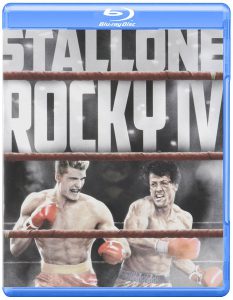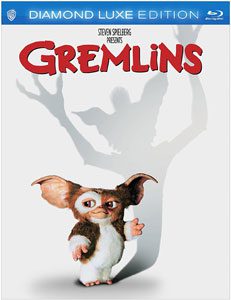With its montages and Eighties arena-rock songs, not to mention the “U.S. versus U.S.S.R.” foundation that begs for the hoariest of subtexts to be added, “Rocky IV” (1985) is unquestionably the most stylized film in the series up to this point. At first blush, it’s a brainless throwaway movie with a must-buy soundtrack highlighted by Robert Tepper’s “No Easy Way Out.” But it is unfairly categorized as the big, dumb and fun entry in the series.
When “Family Guy” cribbed from the “Rocky IV” training montage for its “Empire Strikes Back” parody, it was more of a reflection of how montages have been misused in lesser films. Sylvester Stallone wisely uses montages as shorthand rather than going through similar motions to the previous “Rocky” entries. He also uses them to convey new information. One of the film’s most effective sequences finds a stone-faced Rocky driving through the night, thinking back on his life. Happy images of Adrian are immediately upset by nightmarish images of Ivan Drago, and vice versa. We’ve never been more inside Rocky’s head, and it’s clear he won’t find peace until he defeats the world’s amateur champion.
“Rocky IV” is also misperceived as being a straight-up patriotic film, similar to how Reagan misunderstood Springsteen’s “Born in the U.S.A.” in a stump speech one year prior. Of course, Stallone is more to blame than Springsteen, because he did after all choose to have Rocky wear stars-and-stripes trunks and drape himself in the American flag at film’s end. When a member of Drago’s team (also a member of the Soviet government, naturally) accuses America of being violent, Paulie undercuts that by pointing out that East Berlin’s society is enforced at the barrels of machine guns. Paulie is basically saying “You should be the ones to talk.” “Rocky IV” presents the Soviet Union dimly (literally, as the lighting choices in Drago’s training center and the Moscow arena attest), but it doesn’t present the USA glowingly. Rather than a rah-rah political piece, “Rocky IV” is quite dreary in the wake of Apollo’s death.
Contrasting with the patriotic Apollo, who decks himself out in his full George Washington regalia again for the Vegas fight, Rocky is a humble American rather than an arrogant American. Rocky is fighting for himself, for his family, for the memory of his best friend and yes, for the American ideal of self-determination.
Rocky decides he must fight Drago because it’s for a right and proper cause – but that cause is not necessarily to prove American exceptionalism. A cynic might accuse Stallone of conflating his two iconic characters, because John Rambo is an American soldier who – after being screwed over by his country – continues to fight for causes, whether it’s his own life in “First Blood” or the lives of oppressed people around the globe in the sequels. However, Rocky is by no means out of character; indeed, “Rocky IV” might be the fullest realization of who he is and what he stands for – the idea that he can fight for himself without viewing everyone else as obstacles. When Paulie tells Rocky he wishes he could be like him, he might be referencing his own tendency to see people as potential foes rather than potential friends.
College Humor’s “30 for 30″/”Rocky IV” parody — a very funny piece overall, and another example of this film being embraced by parody artists — suggests that the Soviet crowd cheering for Rocky is inexplicable. Admittedly, the switch is jarring, as the announcers simply note amid a montage of the middle rounds that the crowd has switched its allegiance. But if you’re following the film’s thematic progression, it makes perfect sense.
We see that Ivan Drago trains indoors, surrounded by his crack team of scientists and cutting-edge exercise equipment and monitors. At one point, we see him get injected with ‘roids, despite his team’s public assertion that Drago is an all-natural specimen (maybe the code name for those steroids is “Popeye’s spinach,” making it a mere white lie). The training center is often lit only by the LED readouts: It’s a sterile, futuristic space.
Rocky trains outdoors in the sun-splashed Siberian snow, chopping down trees, pulling sleds and trading out the Philadelphia museum steps for a freakin’ mountain. Several Soviet officials and even a handful of citizens see his training regimen. One Siberian woman even smiles. Those citizens no doubt heard him yelling Drago’s name from the summit.
The spectators at the Balboa-Drago match aren’t privy to all this information, but still, we know that propaganda can only do so much (it’s why every socialist government eventually collapses), and this fight proves it. The Soviet spectators may or may not know Rocky’s inspiring life story, depending on how effective the government has been at blocking Western media. But they certainly don’t know their own appointed hero, Ivan Drago — not only because he’s been training in secret but also because there’s nothing to know about him.
Merely from watching several rounds of the match, the spectators can see Rocky is a man and Drago is a machine, and humans – even those mysterious, gray-clad Soviets – prefer men over machines. Caught up in the energy of the fight rather than the instruction that they root for the beast in the hammer-and-sickle trunks, they simply root for the person they like more.
Rocky may be more likable, but he’s also more familiar to fans of the franchise at this point, so I actually found Drago’s arc to be the most compelling of “Rocky IV.” Although Dolph Lundgren always keeps his face and movements robotic, he manages to convey an undercurrent of humanity starting with Drago’s almost childlike bafflement with the “Living in America” pre-match show in Vegas, replete with showgirls, James Brown and the preening Apollo.
Drago’s two most iconic lines illustrate his character, although – again – the widespread shallow reading of “Rocky IV” misconstrues their meaning. When Drago says “If he dies, he dies,” it can be read as unadulterated evil, but really, it’s just the viewpoint of a machine that doesn’t care one way or another. Drago didn’t set out to murder Apollo, but if he should happen to die, so be it. And it’s not an accident that Drago says “I MUST break you” rather than “I WILL break you.” “Must” means he has been instructed by his government to destroy Rocky; this becomes explicit when one of Gorbachev’s officials climbs down to the ring from on high and slaps Drago after the 14th round and commands him to win. And that sparks the completion of Drago’s transition from machine to man: Fed up with being told what to do, he decides to fight for himself, and he immediately curbs Rocky’s momentum after several rounds of the American chipping away.
“Rocky IV’s” man/machine dichotomy emerges in other ways, too. Mid-fight, Duke tries to convince Rocky that Drago is just a man, and therefore fallible. At the same moment, Drago is ironically convinced that Rocky is a machine with an iron skull, and therefore unbeatable. The fight’s momentum switches to Rocky. And running parallel to the idea of Drago-as-machine is Paulie’s robot, which he humanizes by giving it a woman’s kindly voice. But he’s ultimately annoyed by it (he resolves to “get her wires tied”); he can’t quite humanize the robot.
Drago, though, does find his humanity. (He doesn’t win the fight, which might be because Stallone couldn’t resist the fan-service ending of a Rocky victory at this point. Despite Rocky’s surge in the later rounds, Drago would’ve won on the scorecard had the fight not ended in a knockout – the Russian clearly lands more punches overall.) Despite losing the bout, Drago scores a personal victory by throwing off the shackles his handlers have placed on his mind.
In Rocky’s post-match interview, he doesn’t say his win proves Americans are better than Soviets, as Apollo would have. He says a one-on-one fight is preferable to 20 million people fighting, which is obviously an expression of his belief that the Cold War should not become a hot war. Still, as much as socialism is predicated on violence or the threat of violence, America is a violent nation, too (heck, the very American “Rocky” series is about contained explosions of violence within a ring), with a significant amount of socialist policies. That’s why Rocky doesn’t say he has paved the path for Soviets to change, he says “Everybody can change.” We can all strive to be free-thinking humans rather than cogs in a machine.
More “Rocky”/”Creed” reviews:


